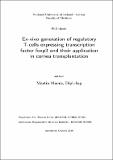| dc.description.abstract | This project investigated the therapeutic potential of allo-antigen specific regulatory
T-cells in the context of penetrating keratoplasty. Two methods of ex-vivo generation
of T regulatory cells have been explored in this study. Using recombinant retroviruses
gene transfer of the transcription factor foxp3 was achieved into allo-antigen specific
primary rat T-cells. However, expansion of foxp3 gene modified cells necessary for
in-vitro and in-vivo studies, was found to be too cumbersome. The second approach
exploited a non-depleting anti-CD4 antibody. Allo-primed mixed lymphocyte cultures
were treated with low-dose anti-CD4 antibody resulting in an outgrowth of foxp3
positive T-cells. CFSE labelled responder T-cells targeted with anti-CD4 treatment
indeed confirmed preferential growth of regulatory T-lymphocytes. Tregs generated
by this procedure were studied by flowcytometry and found to express high levels of
CD25, Ox-40 and ICOS, confirming their suppressor T-cell phenotype. To study Treg
effects on the outcome of allo-graft survival, a full allogeneic cornea transplant model
was established. Two different strain combinations were tested. First, a high
responder LEW-DA model was set-up but was found to be too fragile and unreliable
to serve as a preclinical model. A second novel strain combination was tested and
discovered to be of low-responder characteristics and remarkably robust and highly
suitable for in-vivo applications. The rejection process of the BN-PVG model was
comprehensively studied using flowcytometric analysis of draining lymph nodes.
Moreover, a gentle digestion protocol was established to isolate viable graft
infiltration lymphocytes. Applying multi-parameter FACS six distinct cell populations
were observed among which were CD8+ cytotoxic T-cells, CD4+ T-cells, CD3- CD8+/-
CD161high NK, CD3+ CD8+ CD161dull NK-T-cells, CD161dull large granular
lymphocytes and MHC-2 positive cells. Additionally a serum analysis found evidence
for IgM, IgG1 and IgG2a allo-antibodies in rejection animals. Finally ex-vivo
generated Tregs were tested towards their ability to prevent allo-graft rejection. CD3
sorted regulatory T-cell preparations with direct allo-antigen specificity did not
prevent or delay rejection of allogeneic corneal grafts. The implications of this finding
for the clinical application of adoptive Treg therapies have been discussed in detail. | en |


